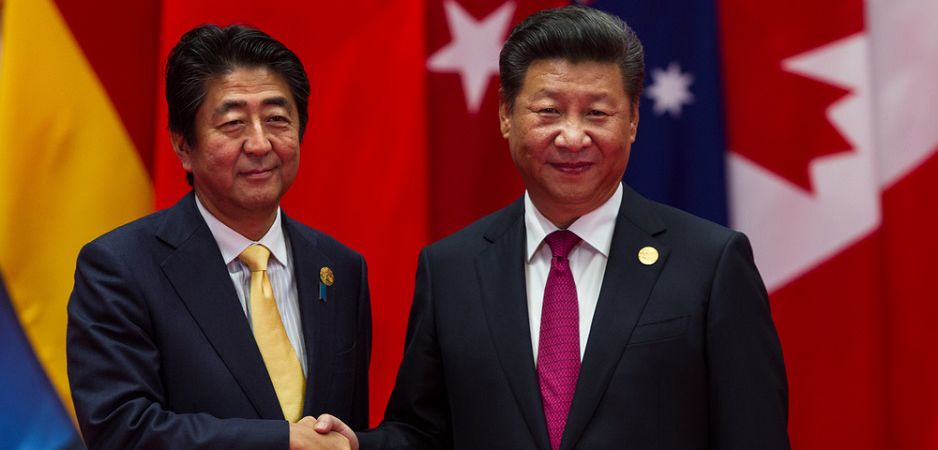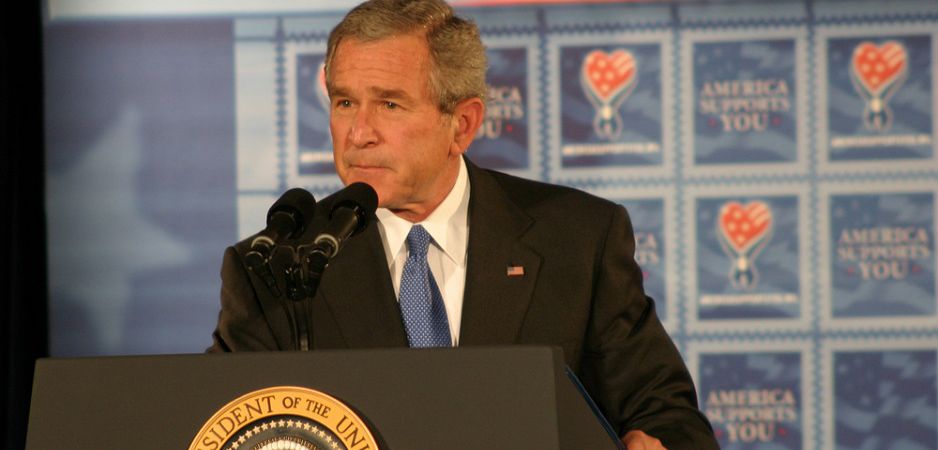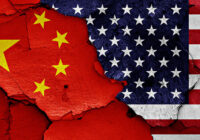With Xi Jinping and Shinzo Abe on the ascendant, tensions are bound to rise in East Asia despite Japan’s aging population and tottering economy.
This week, US Senator Bob Corker turned on the man he endorsed not too long ago. The senator called US President Donald Trump “utterly untruthful” and declared that the president debased the country, weakening its global standing. Corker was bit more charitable than a protester who threw Russian flags at Trump and accused him of treason. It seems the United States of America is not so united these days.
Divisions in the US are dwarfed by divisions in Spain though. Madrid has dismissed Catalan leader Carles Puigdemont. Its chief prosecutor is preparing criminal charges against Puigdemont, who is pro-independence and organized a referendum in defiance of the Constitutional Court. Only 43% of voters cast their ballots, but 90% of the votes cast were in favor of independence. This has led Spain into a full-blown constitutional crisis.
Before the crisis, Catalonia had one of the greatest levels of self-government in Spain. The constitution gives the Catalans their own parliament, police force and public broadcaster. Culture, environment, communications, transportation, commerce and public safety were all Catalan domains. It seemed Spain was putting the days of General Francisco Franco behind it and turning into a model democratic European state.
That has all come to an end. Madrid has responded with a heavy hand. Both unionists and secessionists have good arguments, but things have descended from the realm of reason into emotion. Even as many crave independence in Catalonia, hundreds of thousands marched in a huge pro-Spain rally in Barcelona. The issue is now dividing Catalans, Spaniards and even Europeans.
It turns out that Kenyans are divided too. Fewer than 34% of voters turned up to vote in an election rerun that the opposition boycotted. The rerun occurred because the Supreme Court annulled the August election citing “irregularities and illegalities.” It was supposed to decide on an appeal to delay the rerun, but only two of the seven judges showed up in court. The deputy chief justice failed to appear after her bodyguard was shot and wounded the day before. All of this sounds rather fishy and 50 people have already died in the violence that broke out since the original election. President Uhuru Kenyatta will trounce his rival Raila Odinga who has already pulled out of the election, but Kenyan democracy is unlikely to emerge in rude health.
Brazilian democracy is not doing much better. President Michel Temer managed to avoid trial on corruption charges. This “master of survival” garnered votes from 251 deputies and beat off the 233 who wanted him in court. Temer is the first president in Brazilian history to face charges when still in office. He is accused of heading a criminal organization and of trying to obstruct the course of justice. Dilma Rousseff was impeached in 2016 for far milder transgressions. Yet Temer presides over an empire of patronage and even his record unpopularity is not enough to push him out of office. The May 15, 2016, edition of The World This Week predicted a bleak future for Brazil. With Temer getting away this week, the future for Brazil has just become bleaker.
Yet it is developments in East Asia that take center stage. In China, the Communist Party voted to enshrine President Xi Jinping’s name and ideology in its constitution, emulating the Great Helmsman. Even Deng Xiaoping’s name and ideology were only added to the constitution after his death unlike Xi and, of course, Mao Zedong. Xi is now the “most powerful Chinese leader since Mao.” In Japan, Prime Minister Shinzo Abe triumphed in snap parliamentary elections that he had called a year early. With a reputation as a right-wing hawk, Abe seems to have profited from tensions over North Korea. Worryingly, Abe has a supermajority that allows him to revise Japan’s pacifist constitution, which he plans to change by 2020.
SIMMERING TENSIONS SET TO RISE
The September 3 edition of The World This Week analyzed how China was in a bind thanks to North Korean saber-rattling. Its troubled and tortured relationship with the Hermit Kingdom notwithstanding, it is still an ally of this anachronistic country. However, Kim Jong-un is more of an asset for Abe than for Xi. In July, the Financial Times questioned the durability of Abenomics after a “raft of scandals.” Yet thanks to fears over North Korea, Abe has ensconced himself more snugly in the premiership this week.
What is going on?
Like Xi, Abe is a princeling. Only, Abe is much more blue blooded and did not experience years of hardship as a peasant, which Xi experienced thanks to the Cultural Revolution. Abe’s father was foreign minister and his grandfather was prime minister. Unsurprisingly, this princeling is a nationalist who wants Japan to turn into a “normal country.” This desire is not new. Generations of right-wing politicians have smarted under the humiliation of World War II.
 Article 9 of Japan’s postwar constitution, which was promulgated on November 3, 1946, states that “the Japanese people forever renounce war as a sovereign right of the nation and the threat or use of force as means of settling international disputes.” It goes on to say that “land, sea, and air forces, as well as other war potential, will never be maintained” and Japan would not have “the right of belligerency” as a state. The nationalists do have a point. This article does seem a bit unfair when other countries have the right to pursue their foreign policy aggressively through threat of war or war itself, leaving Japan weak and vulnerable.
Article 9 of Japan’s postwar constitution, which was promulgated on November 3, 1946, states that “the Japanese people forever renounce war as a sovereign right of the nation and the threat or use of force as means of settling international disputes.” It goes on to say that “land, sea, and air forces, as well as other war potential, will never be maintained” and Japan would not have “the right of belligerency” as a state. The nationalists do have a point. This article does seem a bit unfair when other countries have the right to pursue their foreign policy aggressively through threat of war or war itself, leaving Japan weak and vulnerable.
Junichiro Koizumi, Japan’s former prime minister, called for “reform with no sacred cows” and aimed to get rid of the most sacred of Japanese cows, Article 9. Koizumi wanted Japan to be a normal country and have a military instead of self-defense forces. In May 2001, The Economist pointed out that Japan was the largest contributor to the United Nations and to its peacekeeping budget. Yet the constitution did not allow the country to send troops for any UN operations, blighting its aspirations for a permanent Security Council seat. Nevertheless, Japan’s self-defense forces were the best-equipped in Asia and its defense spending was comparable to China in 2001. The venerable publication of 1843 vintage declared that “Japan’s position is anomalous.” That anomaly is worse in 2017 and Abe has a strong case for amending Article 9. Unlike Koizumi, he has a two-thirds majority to do so.
Yet as Shi Biquan of the Shanghai Academy of Social Sciences argued in 2015, Abe’s normal country will not be entirely normal. Although Shi presents a classic Chinese view, he has a point when he objects to Abe visiting the Yasukuni Shrine. Conservative Japanese take the view that they visit the shrine to “pay homage not just to the dead of the Pacific war, but also to the kami—the divine spirits—of all the 2,466,000 men and women who have lost their lives for Japan since the shrine was founded in 1869.” As Shi wrote, the shrine also “honors 14 Class-A war criminals” who, as per the literature of the shrine, “were cruelly and unjustly tried by a sham-like tribunal of the Allied forces.”
Unlike Germany, Japan has not come to terms with its history. A little over two years ago, Abe came under fire for suggesting that the Japanese military did not coerce thousands of young Korean women into working in frontline brothels for its troops during the war. Notably, Emperor Akihito struck a “more apologetic tone than Abe.” In his article, Shi objects less to Japanese nationalism but more to Abe’s efforts to promote a wrong view of history. This is an objection that Koreans, Malaysians and many other Asians share. Most Asians are not as alarmed by Abe’s victory, though, because they fear China more than Japan. However, the Chinese are certainly disturbed by the rise of Abe. They fear that the Japanese will ally more closely with the US to contain their historic enemy.
Sino-Japanese rivalry over the Diaoyu/Senkaku Islands has already made the East China Sea one of the most dangerous places on Earth. Japan has the support of Washington and Abe is determined to strengthen the US-Japan alliance. Like his grandfather, Abe is using golf as a diplomatic tool. In February, Abe and Trump played the game in Palm Beach, Florida. When the US president visits Japan, golf will resume and so will the Abe-Trump bromance. Abe has given Trump unwavering support for his tough talk against North Korea.
Abe has also been on a charm offensive with Indian Prime Minister Narendra Modi. Abe pledged to provide India about 190 billion yen ($1.68 billion) in low-interest loans for infrastructure projects, including a new high-speed railway employing Japanese bullet train technology. More worryingly for Beijing, the US, India and Japan “deployed front-line warships, submarines and aircraft” in “the tri-nation Malabar exercises in the Bay of Bengal” earlier this year. Needless to say, China fears being hemmed in by this formidable alliance and is speeding up its “blue water navy strategy.” Even as ocean temperatures rise, political tensions might be heating up even faster with Xi’s emergence as de facto emperor and Abe’s rise as an all-powerful premier.
AGING SAMURAIS AND RUSTING SWORDS
Abe might want to counter the rise of the Middle Kingdom and neuter the threat of the Hermit Kingdom, but there are a few wrinkles that he has been unable to iron out. First, the jury is still out on Abenomics. For two decades, Japan has suffered deflation. Abenomics was Abe’s three-pronged approach to jolt the country out of its deflationary malaise. A combination of fiscal expansion, monetary easing and structural reform aimed to boost domestic demand and growth of GDP while boosting inflation by 2%.
Fiscally, Abe has run near-record levels of deficit spending. In 2013, he unleashed a fiscal stimulus of 20.2 trillion yen ($210 billion), of which 10.3 trillion yen ($116 billion) was direct government spending. This gigantic stimulus package focused on building critical infrastructure projects such as bridges, tunnels and earthquake-resistant roads. Spending boosts have followed since. Monetarily, the Bank of Japan has carried out an unprecedented asset purchase program. This policy of quantitative easing (QE) has unleashed a torrent of liquidity into the Japanese economy, pushing interest rates into negative territory. It is supposed to make consumers spend money and companies to invest it, stimulating the economy. Abe has also tried to slash business regulations, cut corporate taxes, make the agricultural sector more competitive, liberalize the labor market and encourage women into the workforce.
Sadly for Abe, the economy has not responded as favorably as his electorate. Growth continues to be sluggish, inflation is well below target and debt continues to balloon. Difficult structural reforms have languished in the face of deep-seated cultural conservatism. The yen has fallen by a dramatic 50% against the dollar since 2012. This has made exports cheaper but imports more expensive. Domestic demand has not changed much, but rival exporters like Germany and China have been warning about a global currency war.
More importantly, Abe has been upended on the economic front by his friend Trump. By jettisoning the Trans-Pacific Partnership, a central feature of the Obama Doctrine that would have boosted Japan at the cost of China, the US has left Japan in an unhappy place. Its export-oriented economy is especially vulnerable in the face of new winds of protectionism. Meanwhile, Japan’s national debt is now over 1 quadrillion yen ($11 trillion), surpassing 245% of its GDP. The International Monetary Fund has repeatedly warned that Japanese debt levels are unsustainable. Abe might want to kick start a more muscular foreign policy, but the Japanese economy is rusting fast.
It is unclear what Japan can do to pull out of its economic mess. It is aging dramatically even as its women are not having many children. Over the last decade, the working age Japanese population declined by 6%. Abe is simultaneously trying to boost both female employment and fertility. This is hard enough for any country, but Japan’s famously chauvinistic culture makes it even more difficult to achieve its twin contradictory goals. Japan’s “rapidly aging and shrinking population” is starving the economy of labor. There are twice as many job vacancies as applicants.
Immigration could be the answer, but this island nation has traditionally been averse to foreigners landing on its shores. The Japanese fear that their cultural identity might be threatened, that crime might rise, and that they might struggle to attract skilled immigrants anyway. Meanwhile, rural communities crumble even as Abe’s “robot revolution” seeks to automate “every corner of [its] economy and society.” That might conceivably work to lift the economy and sustain society, but it will definitely not provide Abe young samurais to flex Japan’s foreign policy muscles. For now, though, Abe’s sun is on the rise in the land of the rising sun.
*[You can receive “The World This Week” directly in your inbox by subscribing to our mailing list. Simply visit Fair Observer and enter your email address in the space provided. Meanwhile, please find below five of our finest articles for the week.]
China’s Cyberwarfare Finds New Targets
Is China a leader in cyberwarfare? China answers yes
With the massive media coverage of Russian cyber interference in recent Western elections, the time is ripe to examine the issue of cyberwarfare in China. China discusses its own emphasis on cyberwar capabilities in several official documents, including the 2015 China’s Military Strategy white paper: “Cyberspace has become a new pillar of economic and social development, and a new domain of national security. … As cyberspace weighs more in military security, China will expedite the development of a cyber force, and enhance its capabilities of cyberspace situation awareness, cyber defense, support for the country’s endeavors in cyberspace and participation in international cyber cooperation, so as to stem major cyber crises, ensure national network and information security, and maintain national security and social stability.” Moreover, in the wake of the massive worldwide WannaCry ransomware attack, China was hit hard… Read more
The Daily Devil’s Dictionary: Bush Defines “Moral Clarity”
Former born-again political leader George W. Bush defines morality for a new generation.
On October 19, George W. Bush shared with the world his slightly indirect critique of Donald Trump, as he warned his audience about the rise of bigotry and populism under the current administration. In particular, he lamented the loss of “moral clarity” in the younger generations. Here is what he said: “There are some signs that the intensity of support for democracy itself has waned, especially among the young who never experienced the galvanizing moral clarity of the Cold War or never focused on the ruin of entire nations by socialist central planning.” Moral clarity is a term that has become rare in political discourse, especially when politicians are speaking among themselves. It is far more useful when speaking to a public who haven’t had time to think about the issue addressed… Read more
Qatar Crisis Broadens Definitions of Food Security
The Qatar crisis has showed that size is no longer the only factor that determines a state’s ability to chart an independent course.
Food security has taken on a new dimension in the Qatar crisis. The standoff pits an Emirati-Saudi alliance against Qatar, and there appears to be no end in sight. The United Arab Emirates and Saudi Arabia would deny that they are attempting to starve Qatar into submission. The diplomatic and economic boycott has forced the Qataris to seek alternative food suppliers and alternative air and sea shipment routes. Yet the de facto strategy by Abu Dhabi and Riyadh is to drive up the cost of Qatari food and other imports — to the point that Doha can no longer afford the more expensive imports. In the process, the boycott has redefined the national security aspects of food security, particularly for small states that are more vulnerable to external… Read more
Silencing of Dissent in India Spells a Weakness of Democracy
Across India, dissenters from the mainstream narrative pay the ultimate price for their opinions.
India has a rich history of questioning and philosophizing. In ancient India, women like Gargi were lauded for their ability to tire people at debates. Atal Behari Vajpayee, India’s former prime minister, was noted for his ability to weave language beautifully during debate. Democracy was the very foundation of the newborn nation of India in 1947. In the early days of independence, people spoke up for their rights, went on hunger strikes and openly protested against the government. Amidst this struggle, India became an example for other nations in the way it stuck together as a country and a democracy, despite its extreme diversity and dissent from one corner to another. The country’s democratic tradition took an ugly turn in 1975, when the Indira Gandhi-led government presided over a period that became known… Read more
Canada Needs a New Electoral System
Considering the problems associated with a first-past-the-post system, the time has come for Canada to change its electoral model.
Over the years, there has been much debate on whether Canada should keep its current system of first-past-the-post or move to another form of electoral system. Although Prime Minister Justin Trudeau’s campaign platform raised this issue, the promise to deliver has since failed. In 2016, the Special Committee on Electoral Reform’s decision to not move forward with a new model disappointed young Canadians who were passionate about this democratic change. With the election of the New Democratic Party’s (NDP) Jagmeet Singh and his campaign promise to change the system, electoral reform has once again become a big issue in Canada. With the next federal election in 2019 and young political contenders waiting to jump into the ring, it is important that Canadians know what electoral reform is and what… Read more
*[This article was updated on November 6, 2017.]
The views expressed in this article are the author’s own and do not necessarily reflect Fair Observer’s editorial policy.
Photo Credit: plavevski / Shutterstock.com
Support Fair Observer
We rely on your support for our independence, diversity and quality.
For more than 10 years, Fair Observer has been free, fair and independent. No billionaire owns us, no advertisers control us. We are a reader-supported nonprofit. Unlike many other publications, we keep our content free for readers regardless of where they live or whether they can afford to pay. We have no paywalls and no ads.
In the post-truth era of fake news, echo chambers and filter bubbles, we publish a plurality of perspectives from around the world. Anyone can publish with us, but everyone goes through a rigorous editorial process. So, you get fact-checked, well-reasoned content instead of noise.
We publish 2,500+ voices from 90+ countries. We also conduct education and training programs
on subjects ranging from digital media and journalism to writing and critical thinking. This
doesn’t come cheap. Servers, editors, trainers and web developers cost
money.
Please consider supporting us on a regular basis as a recurring donor or a
sustaining member.
Will you support FO’s journalism?
We rely on your support for our independence, diversity and quality.











